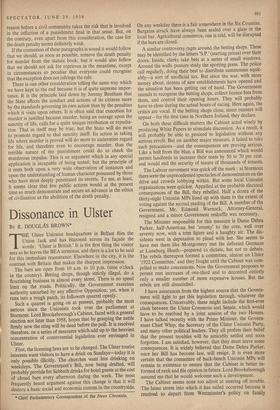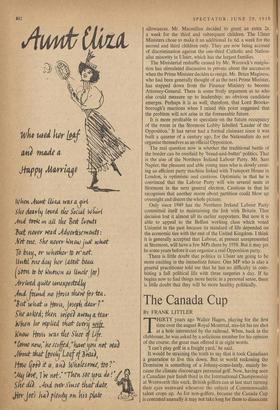Dissonance in Ulster
BY R. DOUGLAS BROWN* THE Ulster Unionist headquarters in Belfast flies the Union Jack and has blazoned across its façade the words : 'Ulster is British.' It is the first thing the visitor sees as he leaves the BEA terminus, and there is a.lot to be said for this immediate reassurance. Elsewhere in the city, it is the contrast with Britain that makes the sharpest impression.
The bars are open from 10 a.m. to 10 p.m. (nine o'clock in the country). Betting shops, though strictly illegal, do a flourishing business in almost every street. There is no speed limit on the roads. Politically, the Government exercises authority uncurbed by any effective Opposition; yet, when it runs into a rough patch, its followers quarrel openly. Such a quarrel is going on at present, probably the most serious since the Unionists took over the parliament at Stormont. Lord Brookeborough's Cabinet, faced with a general election not later than 1958, hopes that by grasping the nettle firmly now the sting will be dead before the poll. It is resolved therefore, on a series of measures which add up to the heaviest concentration of controversial legislation ever envisaged in Ulster.
First, the licensing laws are to be changed. The Ulster tourist interests want visitors to have a drink on Sundays—today it is only possible illicitly. The churches want less drinking on weekdays. The Government's Bill, now being drafted, will probably provide for Sabbath drinks for hotel guests at the cost of closed bars every afternoon during the week. The most frequently heard argument against this change is that it will destroy a basic social and economic custom in the countryside.
* Chief Parliamentary Correspondent of the News Chronicle. On any weekday there is a fair somewhere in the Six Counties. Bargains struck have always been sealed over a glass in the local bar. Agricultural commerce, one is told, will be disrupted if the bars are closed.
A similar controversy rages around the betting shops. These may be identified by the letters `S.P.' (starting prices) over their doors. Inside, clerks take bets at a series of small windows. Around the walls punters study the sporting press. The police call regularly, doing their best to distribute summonses equit- ably—a sort of unofficial tax. But since the war, with more money about, dozens of .new establishments have opened and the situation has been getting out of hand. The Government intends to recognise the betting shops, collect licence fees from them, and control their opening hours. They will probably have to close during the actual hours of racing. Here again, the critics are vocal. If the betting shops close, street runners will appear—for the first time in Northern Ireland, they declare.
On both these difficult matters the Cabinet acted wisely by producing White Papers to stimulate discussion. As a result, it will probably be able to proceed to legislation without any serious revolt. But on another major measure, it failed to take such precautions—and the consequences are proving serious. Like a bolt from the blue, a Bill was announced which would permit landlords to increase their rents by 50 to 70 per cent. and would end the security of tenure of thousands of tenants.
The Labour movement was quick off the mark : at Stormont there were the unprecedented spectacles of demonstrators on the drive and crowds lobbying within. But some local Unionist organisations were quicker. Appalled at the probable electoral consequences of the Bill, they rebelled. Half a dozen of the thirty-eight Unionist MPs lined up with them to the extent of voting against the second reading of the Bill. A member of the Government, Mr. Edmond Warnock, Attorney-General, resigned and a minor Government reshuffle was necessary.
The Minister responsible for this measure is Dame Dehra Parker, half-American but !county' to the core, well over seventy now, with a trim figure and a haughty air. The dis- sidents went in deputation to plead with her. She seems to have met them like Montgomery met the defeated Germans at Luneburg Heath—prepared to dictate, but not to debate. The rebels thereupon formed a committee, almost an Ulster `1922 Committee,' and they fought until the Cabinet was com- pelled to make concessions. Now the Government proposes to permit rent increases of one-third and to decontrol entirely only a smaller number of more expensive houses. But the rebels are still dissatisfied.
I have assurances from the highest source that the Govern- ment will fight to get this legislation through, whatever the consequences. Conceivably, these might include the first-ever clash between the Ulster Commons and Senate, which would have to be resolved by a joint session of the two Houses. I have talked recently with the Prime Minister, the Govern- ment Chief Whip, the Secretary of the Ulster Unionist Party, and many other political leaders. They all profess their belief that the present troubles will be amicably settled and soon forgotten. I am satisfied, however, that they must leave some consequences. It is widely believed that Dame Dehra Parker, once her Bill has become law, will resign. It is even more certain that the committee of back-bench Unionist MPs will remain in existence to ensure that the Cabinet is better in- formed of rank and file opinion in future. Lord Brookeborough assured me that he would welcome such a development.
The Cabinet seems none too adroit at steering off trouble. The latest storm into which it has sailed occurred because it resolved to depart from Westminster's policy on family allowances. Mr. Macmillan decided to grant an extra 2s. a week for the third and subsequent children. The Ulster Ministers chose to make it an additional ls. 6d. a week for the second and third children only. They are now being accused of discrimination against the one-third Catholic and Nation- alist minority in Ulster, which has the largest families. The Ministerial reshuffle caused by Mr. Warnock's resigna- tion has stimulated discussion in private about the succession when the Prime Minister decides to resign. Mr. Brian Maginess, who had been generally thought of as the 'next Prime Minister, has stepped down from the Finance Ministry to become Attorney-General. There is some lively argument as to who else could measure up to leadership; no obvious candidate emerges. Perhaps it is as well, therefore, that Lord Brooke- borough's reactions when I raised this point suggested that the problem will not arise in the foreseeable future.
It is more profitable to speculate 'on the future, occupancy of the room in the Stormont Lobby labelled 'Leader of the Opposition.' It has never had a formal claimant since it was built a quarter of a century ago, for the Nationalists do not organise themselves as an official Opposition.
The real question now is whether the traditional battle of the border can be overlaid by 'bread-and-butter' politics. That is the aim of the Northern Ireland Labour Party. Mr. Sam Napier, the pleasant and able young man who is slowly creat- ing an efficient party machine linked with Transport House in London, is optimistic and cautious. Optimistic in that he is convinced that the Labour Party will win several seats at Stormont in the next general election. Cautious in that he recognises that another storm about partition could blow up overnight and distort the whole picture.
Only since 1949 has the Northern Ireland Labour Party committed itself to maintaining the link with Britain. That decision lost it almost all its earlier supporters. But now it is able to appeal to the Belfast working class which voted Unionist in the past because its standard of life depended on the economic ties with the rest of the United Kingdom. I think it is generally accepted that Labour, at present unrepresented at Stormont, will have a few MPs there by 1958. But it may yet be some years before it can organise a real Opposition party.
There is little doubt that politics in Ulster are going to be more exciting in the immediate future. One MP who is also a general practitioner told me that he has no difficulty in com- bining ' a full political life with three surgeries a day. If he begins now to find things more heCtic in a personal sense, there is little doubt that they will be more healthy politically.



































 Previous page
Previous page